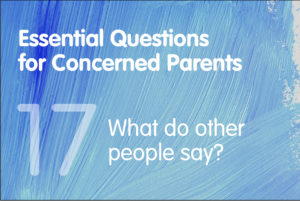 Have you checked in with the people in your circle and your community: your mate, your other children, your parents, and anyone else who knows your child well? What are their thoughts about what’s going on?
Have you checked in with the people in your circle and your community: your mate, your other children, your parents, and anyone else who knows your child well? What are their thoughts about what’s going on?
They may have nothing useful or productive to offer or they may have some very important insights into what’s happening. Ask the people who know your child what they think might be going on. Make a special effort to check in with those people who seem the most levelheaded and whose opinions you respect the most. Is there a friend you always turn to when you’re having problems? Maybe that’s also the right person to chat with about your child’s difficulties.
As you chat with the people in your circle, see how they come at challenges and how they conceptualize what helps. Is one quick to suggest specialists? Is another quite skeptical of the supposed expertise of mental health practitioners? Does a third have firsthand experience of what goes on in a mental health treatment facility or firsthand experience with psychiatric medication? Some of these topics may prove sensitive, so by all means tread carefully. But do courageously tread. You don’t want to miss learning exactly what you need to know because you feel embarrassed about broaching what feels like an awkward subject. Even if you don’t land on pertinent advice, you may discover that some inner wisdom has gotten activated, providing you with a better sense of what you want to try next.
*****
Read the Concerned Parents’ Project Introductory Post
To get in touch or to share your feedback, please email us
Read more on this topic
Interview: Parents Beware: Danger Ahead
Visit Parent Resources for additional in-depth articles














